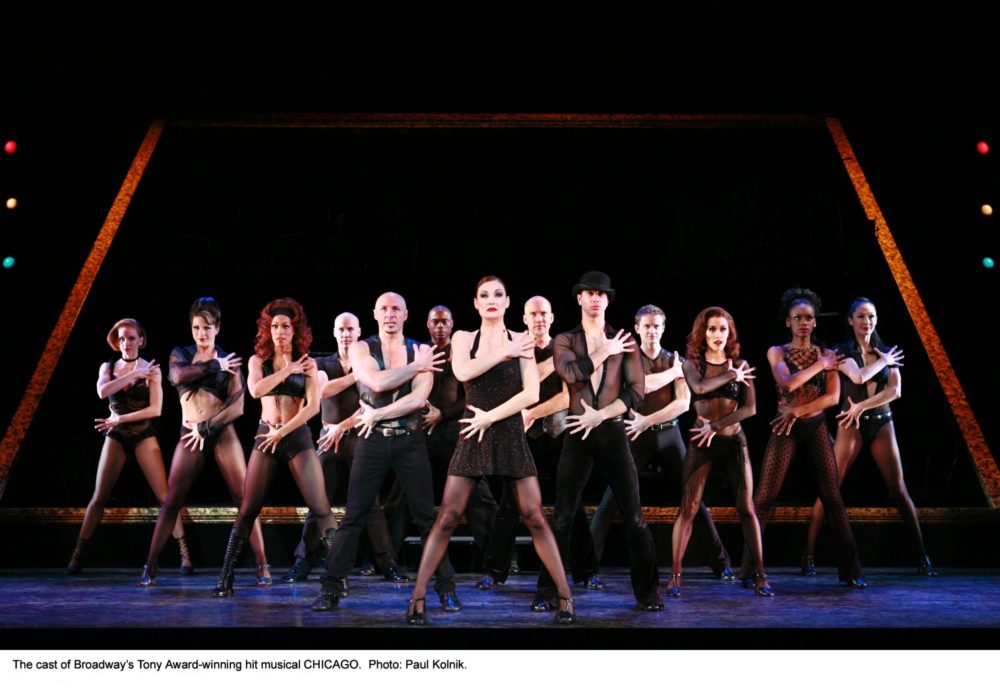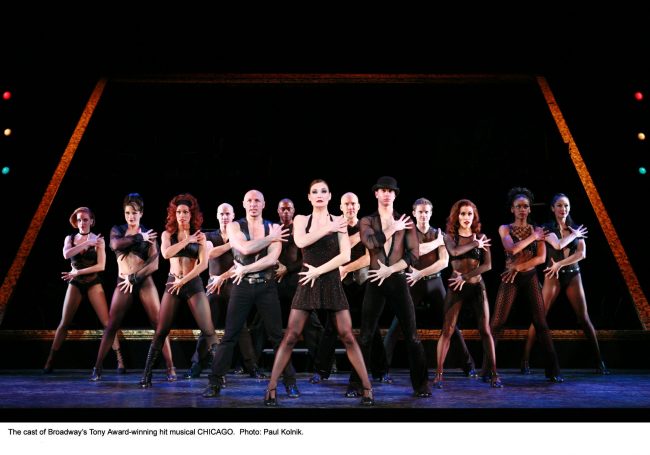
Terra C. MacLeod leads Chicago’s company in the musical’s opening number, “All That Jazz.” Chicago is currently the longest running American musical in the history of Broadway. (Courtesy of the AT&T Performing Arts Center)
There’s a lot we can learn from Chicago the musical, from the manipulation of the media to the downfalls of jazz and liquor, much of its storyline is just as pressing today as it was in 1920.
The original story stems from a 1926 play of the same name written by journalist Maurine Dallas Watkins.
Watkins reported on the gradual celebrity status of criminals and the corruption riddled throughout the 1920s justice system. Her initial reports are sewn deep into the Winspear’s big band, jazz-handed production of Chicago.
The story revolves around two jail-bound broads, Roxie Hart (Tracy Shayne) and Velma Kelly (Terra C. MacLeod) and the desperate, headline grabbing acts they undergo in hopes of gaining notoriety beyond the jail house walls.
The show’s staging is simple, one large brass band sits prominently in the center of the action while a bevvy of actors slides in and out of concealed entrances.
In fact, the only large set pieces that stand out in Chicago are two tall black ladders occasionally used by Roxie and Velma in numbers like “Funny Honey” and “Me and My Baby.”
By staging the production as so, Chicago forces the audience to focus on one of the gleaming aspects of the production, the orchestra.
Directed by Eric Barnes, Chicago’s orchestra keeps up with the blistering pace of the show’s choreography and steals certain numbers, like “Razzle Dazzle” and “Hot Honey Rag” in the process.
The bulk of Chicago’s plot features Roxie and Velma both vying for the same platform of attention while growing less and less fond of each other as headlines whirl by.
Terra C. MacLeod’s Velma is strong-willed and determined, just what the role calls for. However, MacLeod’s voice was muddled and raspy on opening night that in turn diminished Velma’s presence on stage, particularly in the musical’s iconic opening number “All That Jazz.”
While MacLeod’s singing was sub-par, the performer’s dancing was divine. Each Fosse-style kick and shoulder shrug oozed of confidence and control.
Velma’s on-stage nemesis Roxie Hart, played by Tracy Shane, delivered a solid performance free from vocal hindrances or errors. And just like MacLeod, Shane delivered when it came to the show’s complicated dance routines.
As a critic, I try my hardest to stay away from critical cliches like “stole the show.” But in the case of Kecia Lewis-Evans’ turn as Matron “Mama” Morton, consider me cliched — Lewis Evans stole the show.
With a big, powerful voice Lewis-Evans filled the wings of the Winspear during her featured number “When You’re Good to Mama.” The performer used the number to display her enormous range and impressive pitch and by the time the number was over, the audience was going wild.
Coming in a close second to Lewis-Evans’ impressive performance was John O’Hurley’s turn as the fast-talking, super slick lawyer Billy Flynn.
O’Hurley, a star of television’s Dancing with the Stars and Seinfeld, is the cover boy for this tour of Chicago.
O’Hurley’s take on Flynn is smooth, calm, cool and collected. The once host of Family Feud carries with him an impressive voice capable of pulling off such numbers as “Razzle Dazzle” and “We Both Reached for the Gun” with ease.
With a talented cast and a superb orchestra, AT&T Performing Arts Center’s production of Chicago is a razzling, dazzling hit.
Book It
Chicago is part of the Lexus Broadway Series at the AT&T Performing Arts Center. Aug. 14 to Aug. 26. Visit www.attpac.org or call 214-880-0202 for more information.









